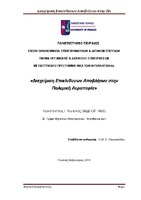Διαχείριση επικίνδυνων αποβλήτων στην Πολεμική Αεροπορία

Προβολή/
Λέξεις κλειδιά
Διαχείριση επικίνδυνων αποβλήτων ; Πολεμική ΑεροπορίαΠερίληψη
Τα επικίνδυνα απόβλητα και η διαχείριση τους αποτελούν σήμερα ένα από τα μεγαλύτερα παγκόσμια προβλήματα, εξαιτίας των πολλών και αρνητικών συνεπειών τους στην δημόσια υγεία και το περιβάλλον.
Το πρόβλημα της παραγωγής των επικίνδυνων αποβλήτων προέκυψε εξαιτίας της βιομηχανικής επανάστασης και της τεράστιας αύξησης του πληθυσμού της γης, τα τελευταία 200 χρόνια, πριν πλην όμως μόλις τα τελευταία 40 με 50 χρόνια άρχισε να απασχολεί και να εντάσσεται στην παγκόσμια ατζέντα.
Το ευχάριστο είναι ότι ο σύγχρονος κόσμος έχει πλέον στην διάθεση του όλα τα σύγχρονα μέσα (γνώσεις, τεχνολογία) έτσι ώστε να καταστεί εφικτό, το πρόβλημα αυτό να ελεγχθεί και να περιοριστεί. Απαραίτητη όμως προϋπόθεση είναι όλοι, κυβερνήσεις, επιχειρήσεις, επιστήμονες, κοινωνία, να ευαισθητοποιηθούν και να δράσουν προς αυτή την κατεύθυνση. Η κατεύθυνση αυτή δεν είναι άλλη από την ανάπτυξη και εφαρμογή κατάλληλων – σύγχρονων συστημάτων διαχείρισης των επικίνδυνων αποβλήτων.
Η αεροπορική βιομηχανία, εξαιτίας της τεράστιας εξάπλωσης της, τα τελευταία χρόνια, αποτελεί ένα πολύ βασικό παραγωγό επικίνδυνων αποβλήτων, σε παγκόσμιο επίπεδο. Ως εκπρόσωπος της εν λόγω βιομηχανίας, στον ελλαδικό χώρο, θεωρείται η Ελληνική Πολεμική Αεροπορία (ΠΑ), στην οποία και εστιάζει η παρούσα εργασία.
Στο πλαίσιο αυτό, στο πρώτο κεφάλαιο της εργασίας, παρατίθενται αρχικά κάποιοι βασικοί ορισμοί- ορολογίες, που σχετίζονται με τα επικίνδυνα απόβλητα, αναφέρονται οι ιδιότητες, οι κατηγορίες, οι βασικοί παραγωγοί και οι προοπτικές παραγωγής αυτών. Εν συνεχεία προσδιορίζονται τα στάδια που απαρτίζουν ένα σύγχρονο σύστημα διαχείρισης και τα πλεονεκτήματα που προκύπτουν από την εφαρμογή τους. Το κεφάλαιο ολοκληρώνεται με την περιγραφή της κατάστασης που επικρατεί σε ΕΕ και Ελλάδα, όσον αφορά την παραγωγή και διαχείριση των επικίνδυνων αποβλήτων.
Το δεύτερο κεφάλαιο, εστιάζεται στην αεροπορική βιομηχανία και τα παραγόμενα επικίνδυνα απόβλητα από τις δραστηριότητες της. Γίνεται εκτεταμένη αναφορά στις εργασίες συντήρησης αεροσκαφών και μέσων- εξοπλισμού, που χρησιμοποιούνται, ενώ για κάθε μία εξ’ αυτών των εργασιών περιγράφονται μέτρα περιορισμού παραγωγής επικίνδυνων αποβλήτων αλλά και των επιπτώσεων τους στην δημόσια υγεία και το περιβάλλον.
Το τρίτο κεφάλαιο, αναφέρεται στην περιβαλλοντική πολιτική του ΥΕΘΑ και των Ενόπλων Δυνάμεων (ΕΔ). Περιγράφονται οι βασικοί τομείς περιβαλλοντικού ενδιαφέροντος, του Υπουργείου, μεταξύ των οποίων συμπεριλαμβάνεται και το θέμα της διαχείρισης των αποβλήτων και η στρατηγική που έχει σχεδιαστεί, για την υλοποίηση της εν λόγω πολιτικής. Το κεφάλαιο ολοκληρώνεται, με την περιγραφή των παραγόμενων επικίνδυνων αποβλήτων από τις δραστηριότητες της Π.Α. και τις δράσεις που αναλαμβάνει αυτή, σχετικά με την διαχείριση του εν λόγω θέματος.
Το τελευταίο κεφάλαιο της εργασίας αποτελεί μία μελέτη περιπτώσεων, δύο συγκεκριμένων Μονάδων της Π.Α., το Κρατικό Εργοστάσιο Αεροσκαφών (ΚΕΑ) και το Εργοστάσιο Τηλεπικοινωνιών- Ηλεκτρονικών Μέσων (ΕΤΗΜ), ως προς τα παραγόμενα εκ των δραστηριοτήτων τους, επικίνδυνα απόβλητα αλλά και τα συστήματα διαχείρισης αυτών που εφαρμόζουν. Στο τελευταίο αυτό κεφάλαιο, προτείνονται επίσης κάποιες λύσεις- πρακτικές- μεθοδολογίες, οι οποίες κατά την εκτίμηση του συγγραφέα θα ήταν δυνατό να βελτιώσουν τα υφιστάμενα συστήματα διαχείρισης, τόσο για τις προαναφερόμενες μονάδες όσο και γενικότερα την Π.Α.


